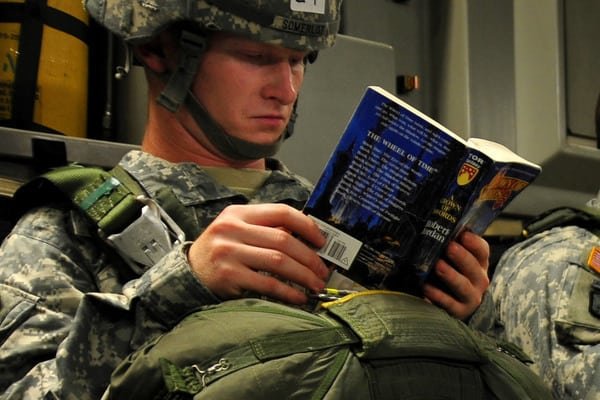
Military Families Facing Food Shortages May Not Ask For Our Help, But Here’s How We Still Can

Although many donors are willing to donate to soup kitchens or food banks, which aim to provide quality food services to those who are not able to afford food for themselves and/or their family, however, while donors are busy finding the right community or government programs collecting donations, military families are usually ignored in the process due to their supposed financial stability.
According to data, the extent of food insecurity faced by military families or veteran families is greater than the that faced by the general population in America. According to one survey conducted in 2017, almost 15% of military families face times when they are unable to afford food as compared to 12.9% of the general population of America.
When this finding was further researched, surprisingly it was found that factors that contribute to food shortages, such as a financial crisis, were the same for non-military families as well as for military families.
However, the only difference is that military families usually do not seek support through common support channels, even when they need support to put a decent meal on the table. In fact, their need for household expenditure is greater considering the fact that they have to relocate to different regions all the time. These families are accustomed to resolving their problems on their own and are reluctant to ask for help regarding daycare or food shortages.

While donors are busy finding the right community or government programs collecting donations, military families are usually ignored in the process due to their supposed financial stability.
The Military Family Advisory Network
According to the Military Families Advisory Network, these families are reluctant to ask for help even when it is to fulfill their basic needs because they are trained to survive on their own as well as have learned to make sacrifices for others. For this reason, they believe in self-reliance and do not want to put their food shortage burden on the system as it is already overburdened. Instead, they want to stay at the back-end. A core belief that causes further reluctance is the fact that military families believe that the general population is facing a tougher time than them, and hence are more deserving of financial aid.
Another reason could be that their self-image or their pride takes a hit when they ask for help. According to the Advisory Network, many military families who do not accept any food support are actually working very hard to meet their financial resource requirements behind the closed doors of their homes.

According to the Advisory Network, these families are reluctant to ask for help even when it is to fulfill their basic needs because they are trained to survive on their own as well as have learned to make sacrifices for others.
The Fear of Possible Problems
On the other hand, some veteran families also believe that displaying hardships, even with respect to shortages of food, could impact their employment. In fact, seeking food support through common channels could affect their security clearance issues. For example, if any family seeks help of any military aid program, then they fear it will jeopardize their image and they could be deemed as unfit to the service.
Considering these challenges, the Advisory Network has intimated different organizations including Red Cross, Center for Food Research, USO, United Way, and Feeding America to address the concerns of military families with respect to the food insecurity issue and suggest a long-term plan to resolve this problem. Such discussions on large platforms will definitely give a confidence boost to military families and they will feel more relieved while seeking help regarding food support. There is no doubt that these organizations need to present military family problems as a matter of concern so these families do not view asking for such support as a sign of weakness.

On the other hand, some veteran families also believe that displaying hardships, even with respect to shortages of food, could impact their employment.
The Purpose
The purpose of this effort is to support military families through different channels by providing them information with respect to deserving families that need food support or daycare services. In order to preserve the respect and dignity of recipients, they would be offered part-time jobs in exchange for the support they will get through these channels. Another way of providing support can be offering them goods at discounted prices at grocery shops, which would help them in affording a quality meal at home.
The aim is to seek out a long-term plan which is sustainable in addressing the requirements of these families. However, building a sense of responsibility toward military families would be critical to incorporate in the model. Being a donor, it is important to understand the requirements of the recipients and then make arrangements to offer them help through the proper channels, at least in a way that they would accept.
More inCommunity
-
`
A Veteran’s Open Letter To The Prince Of Cambridge
If you were born a prince, like a famous Prince of Cambridge, you would have a lot of options for your...
June 5, 2023 -
`
You Must Appreciate the Amazing Growth of the Tulsa Community Foundation
The Tulsa Community Foundation (TCF) is a charitable organization which was founded on the 30th of December 1998 by a banker,...
June 5, 2023 -
`
ELDERBERRIES: Learn about These Powerful, Immune-Strengthening Tart Little Fruits!
What would you do if someone handed you a capsule that could regulate your blood sugar level, help you lose weight,...
June 5, 2023 -
`
Here Is Why Lucy Kennedy Should Be Your Inspiration
For normal people like us, celebrities (or famous people, for that matter) offer a window to the limitless possibilities which we...
June 5, 2023 -
`
If You’re Among The Health-Watchers, You Should Probably Know About Pre-Diabetes
If you’re an adult and consider yourself sufficiently aware, you know what diabetes is. The disease is so common that even...
June 2, 2023 -
`
Motivation Isn’t Enough to Get You to the Finish Line; You Need Discipline!
Motivation is the intrinsic spirit to undertake a challenging task. It is the positive enforcement that comes from within and keeps...
June 2, 2023 -
`
Gardening and Green Activities: a Definite Solution for Your Anxiety Attacks!
If you are not fond of nature and nurturing plants, you may be shaking your head at the idea of gardening....
May 30, 2023 -
`
Health Benefits Of Eating Beets You Probably Didn’t Know
Beets have gained much importance as a healthy low-calorie food option in many diet charts. It has become one of the...
May 30, 2023 -
`
Best Books Ever Written About War That Every Man Should Read
Every military service member needs his daily dose of knowledge and skill enhancement, inspiration and motivation. And reading some books about...
May 30, 2023















You must be logged in to post a comment Login